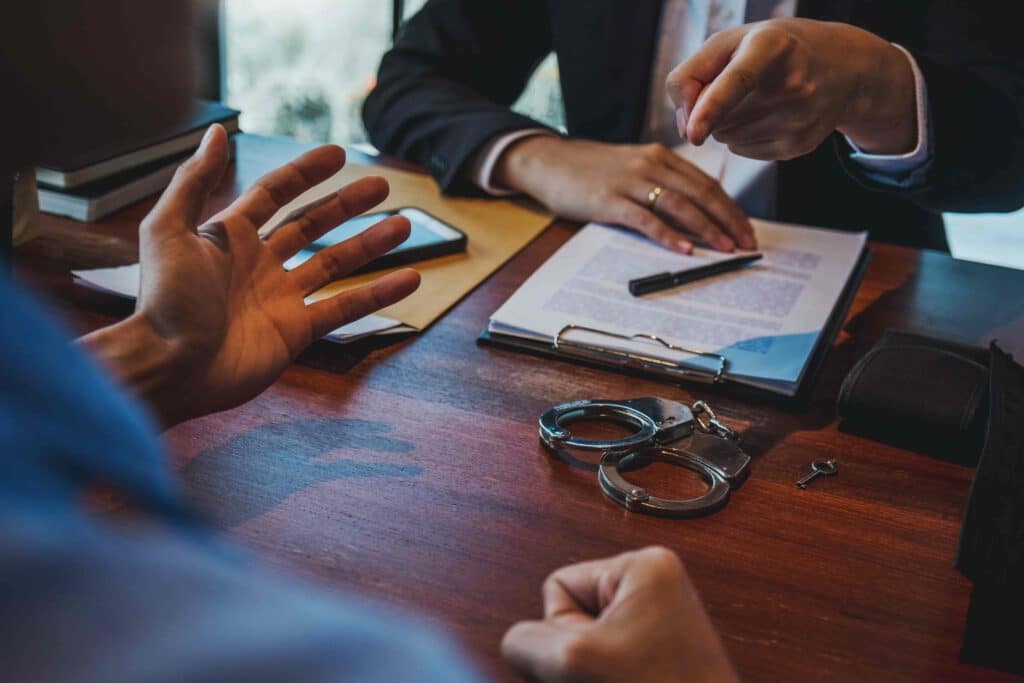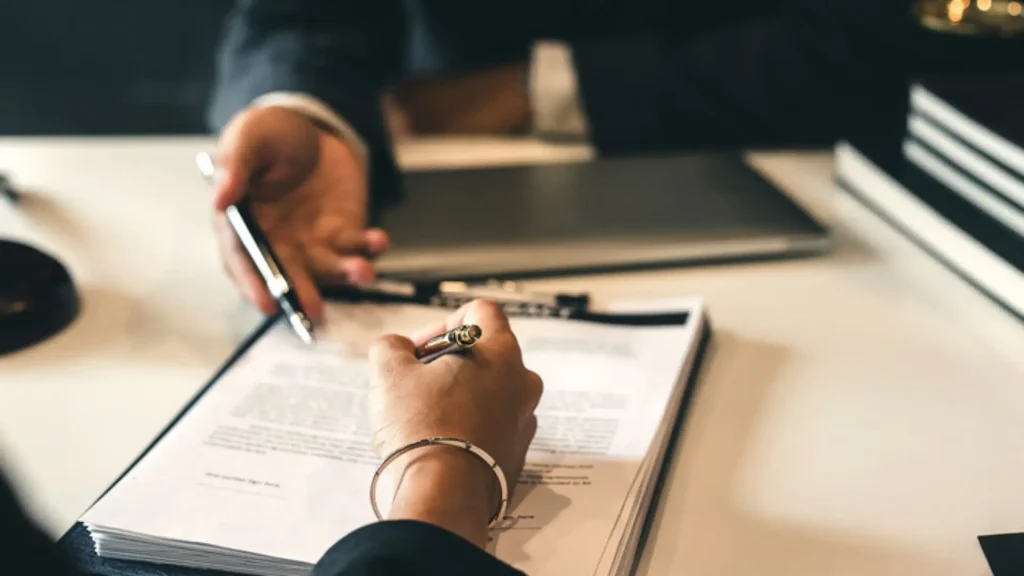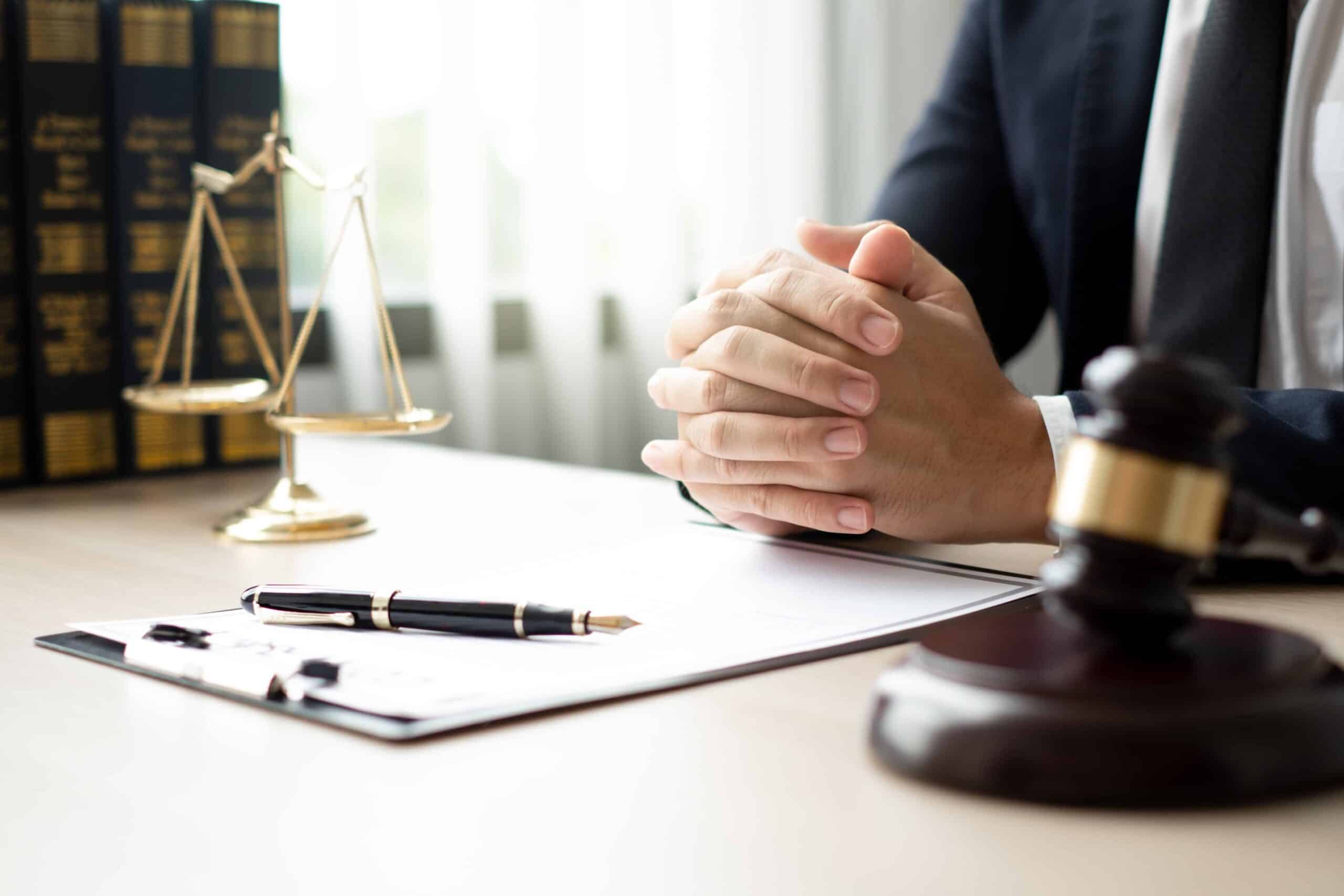What Does a Criminal Defense Lawyer Do?
When you are accused of a crime, the government marshals its vast resources to build a case against you. Every action the state takes is designed to secure a conviction from that moment forward.
Many people wonder, what does a criminal defense lawyer do in the face of such power?
They do far more than argue in a courtroom; they become your strategist, protector, and unwavering advocate, working immediately to dismantle the prosecution’s case.
Key takeaways
- A criminal defense lawyer’s work begins immediately, acting as a shield between you and law enforcement to protect your constitutional rights from the start.
- Beyond the courtroom, a defense attorney serves as a private investigator, scrutinizing the prosecution’s evidence, uncovering new facts, and identifying procedural errors.
- Your lawyer serves as your strategic advisor and negotiator, analyzing the case to develop a strong defense and pursuing favorable outcomes, such as reduced charges.
- Ultimately, a defense lawyer is your dedicated advocate, responsible for telling your story and fighting for a just outcome, whether in negotiations or at trial.
Your Shield
A defense attorney’s most urgent job begins the second you contact them. They step in to shield you from the pressures of a criminal investigation and ensure your fundamental rights are upheld.
This protective role is active, not passive, and sets the foundation for your entire defense. It is about creating a barrier between you and the immense power of the state.
Halting Interrogations and Protecting Your Rights

From the moment of arrest, you have rights guaranteed by the U.S. Constitution. A lawyer makes these rights a reality. They immediately notify law enforcement that counsel represents you.
This action legally requires police to cease all questioning and direct all future communication through your attorney. This step is vital. Innocent people are often urged to explain their side of the story, but police are trained to elicit incriminating information.
Even a simple, truthful statement can be taken out of context. Your lawyer prevents this by managing all communication on your behalf.
Arguing for Bail and Fair Pretrial Release
One of the first court proceedings is a bail hearing, often before a Montgomery County District Court Commissioner. A lawyer’s advocacy here is crucial for your freedom while the case is pending. They present you as a person with ties to the community, not just a defendant.
A skilled attorney argues for the least restrictive release conditions possible. This involves presenting a compelling case to the judge by highlighting specific positive factors.
- Demonstrating your stable employment history.
- Highlighting your family and community connections in Rockville.
- Presenting evidence that you are not a flight risk.
- Arguing against an excessive bail amount that you cannot afford.
Securing your release on reasonable terms allows you to continue working and living at home. It also makes it much easier to participate actively in your own defense.
Your Investigator: Uncovering the Full Story

The police report and the prosecutor’s charges represent only one side of the story. A dedicated criminal defense lawyer never accepts this narrative at face value. Instead, they become private investigators, committed to uncovering the complete picture and finding the facts that law enforcement missed.
Meticulously analyzing the state’s evidence
Through a legal process called discovery, your attorney compels the prosecution to turn over all the evidence it has gathered. This is a thorough examination of the state’s case, seeking any weaknesses or inconsistencies.
The review includes police reports, lab results, dash-cam videos, and witness statements. Your lawyer is looking for procedural mistakes, violations of your rights, or evidence that points away from you.
Under the law, prosecutors must also provide any exculpatory evidence—information that could help prove your innocence. A diligent defense lawyer ensures the state complies with this critical obligation.
Conducting an independent factual investigation
A proactive defense does not just react to the prosecution; it builds its own case. Your lawyer launches an independent investigation to find evidence that supports your innocence or casts doubt on the state’s claims.
This often involves going far beyond the initial police work. An independent defense investigation is a thorough and often complex process. The goal is to gather information that can be used to effectively challenge the prosecutor’s narrative.
- Locating and interviewing defense witnesses who were never contacted by police.
- Hiring private investigators to canvass the area or uncover new leads.
- Subpoenaing phone records, surveillance videos, or other crucial documents.
- Engaging forensic experts to re-test evidence or challenge the state’s scientific findings.
This investigative work can uncover a mistaken identity, reveal a witness’s bias, or prove that evidence was mishandled. It is the foundation upon which a strong defense is built.
Your Strategist: Crafting a Coherent Legal Defense

Once all the information is gathered, your lawyer transitions into the role of a legal strategist. They combine the facts of your case with their deep knowledge of Maryland law to develop a comprehensive plan designed to achieve the best possible outcome. This is where legal expertise transforms raw facts into a powerful defense.
Developing the Core Defense Theory
Every strong defense has a clear, central theme. Your lawyer will analyze all the evidence to determine the most effective theory. It might be that you have a solid alibi, that you acted in self-defense, or that the police engaged in an unlawful search and seizure in violation of your Fourth Amendment rights. This theory becomes the guiding principle for every decision made in your case.
Filing strategic pre-trial motions
Much of the legal battle happens before a trial even begins. Your attorney will file strategic pre-trial motions to shape the case in your favor. These formal requests ask the judge to make specific rulings that can significantly weaken the prosecution’s position.
Common motions include a motion to suppress evidence obtained illegally or a motion to dismiss the case entirely due to a fatal flaw in the state’s argument.
Providing honest counsel and a clear-eyed assessment
A critical part of a lawyer’s job is to be a straightforward and honest advisor. They will explain the strengths and weaknesses of your case, the potential consequences you face, and the risks associated with going to trial versus accepting a plea offer.
This transparent communication empowers you to make well-informed decisions about your own future at every stage.
Your Negotiator: Pursuing a Favorable Resolution

While every case must be prepared for trial, the reality is that many criminal matters are resolved through plea negotiations. In this arena, your lawyer acts as your skilled negotiator, using the strengths of your defense to bargain with the prosecutor from a position of power.
Leveraging evidence to gain an advantage
The evidence uncovered during the investigation is a powerful bargaining chip. When a lawyer can show the prosecutor that a key piece of evidence is inadmissible, that a primary witness is not credible, or that the police violated procedure, the state’s confidence in its case may falter. This leverage is often what persuades a prosecutor to offer a favorable plea agreement, such as a reduction to a lesser charge.
The lawyers at the firm also have seasoned and trusted experts in all relevant fields that they can call on to assist you. This includes fields such as:
- Forensic Psychology
- DNA Testing and Evaluation
- Firearms Examination
- Forensic Digital Evidence Review
Arguing for alternatives to incarceration
A conviction does not automatically mean a jail sentence. An effective defense attorney advocates for sentencing alternatives that focus on rehabilitation and allow you to move forward with your life.
The Maryland justice system offers several such options. A creative legal advocate will present a compelling case for alternatives to jail time. These options can provide a second chance while satisfying the court’s requirements.
- Probation. This allows you to serve your sentence in the community under supervision.
- Diversion programs. Successful completion of a program can lead to the charges being dismissed.
- Specialty courts. Maryland has options like Drug Treatment Court that focus on rehabilitation.
- Sentence modification. In some cases, a lawyer can later ask the court to modify the original sentence.
Your lawyer’s job is to humanize you to the court and the prosecutor, presenting you as a whole person, not just a case number. This advocacy can make all the difference in the final outcome.
Championing your cause in court
If your case proceeds to trial, your lawyer’s role culminates as your voice and champion in the courtroom. Before a judge and jury, they present your story, challenge the prosecution’s narrative, and fight tirelessly for your acquittal.
Mastering the art of jury selection
A trial begins with selecting a jury. This process, known as “voir dire,” is a critical opportunity for your lawyer to identify and remove potential jurors who may have biases against you. The goal is to seat a fair and impartial jury that will be open to hearing your side of the story.
Telling your story through evidence and argument
A trial is fundamentally a battle of competing narratives. Your attorney’s job is to present a coherent and persuasive story that creates reasonable doubt about the prosecution’s claims. They do this through opening statements, the direct examination of defense witnesses, and a powerful closing argument that ties all the evidence together in your favor.
Cross-Examination
One of a trial lawyer’s most important skills is the ability to cross-examine the prosecution’s witnesses. During cross-examination, your lawyer will confront witnesses with inconsistencies in their testimony, expose potential motives to lie, and challenge their memory of events.
This process is essential for poking holes in the state’s case and revealing the weaknesses in their evidence.
FAQ
Why can’t I just represent myself if I’m innocent?
The legal system has complex rules of evidence and procedure that are difficult for non-lawyers to navigate. An innocent person can be convicted if they do not know how to properly challenge the state’s evidence or present their own. A lawyer ensures your defense is presented effectively and your rights are protected throughout the process.
Does my lawyer need to know if I am guilty?
Your communications with your lawyer are protected by attorney-client privilege. This means they are confidential. It is vital to be completely honest with your attorney. Knowing all the facts, good and bad, allows them to build the strongest possible defense and avoid being surprised by the prosecutor at trial.
How often will I be in contact with my criminal defense lawyer?
Communication frequency depends on the stage of your case. You might speak with your lawyer often during the initial investigation and as a trial date approaches. There may be quieter periods in between. A good lawyer or their staff will keep you informed of any significant developments and be available to answer your questions.
What happens if we lose at trial?
The case moves to the sentencing phase if a guilty verdict is returned. Your lawyer will argue for the most lenient sentence possible. After sentencing, they will analyze the trial record for any legal errors that could form the basis of an appeal process to a higher court, opening another avenue to continue fighting your case.
Start Building Your Defense Today

When your future is at stake, you need more than just a lawyer; you need a dedicated defender who will fill all of these critical roles. The right advocate can challenge the prosecution at every turn and give you the best possible chance at a positive outcome.
If you face criminal charges in Rockville or Montgomery County, the time to act is now. Contact the team at Seddiq Law for a confidential consultation to discuss your case.
At Seddiq Law, we are ready to listen to your story and explain how we can help. Call us at (301) 513-7832 for a confidential consultation.
You can also complete our secure online intake form here. Once completed, an attorney will contact you within ten (10) minutes.


